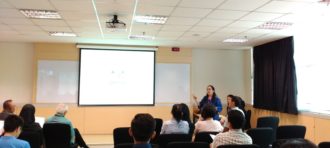TOP 10 SKILLS NEEDED FOR FUTURE JOBS, WHAT ARE THEY?

Constant changes and development are inevitable factors, especially in today’s industry and professional world. Digital technology and globalization are the key drivers of behavior and future skills requirements.
Dewi Tamara, MM, MS, the Deputy Head of MM Executive Program of BINUS BUSINESS SCHOOL, said that in Indonesia itself, the digital savvy is massive. Specifically, there are 88.1 million internet users, 63.4 million smartphone users, 308.2 million mobile phone users, 3 hours per day average of internet access via mobile devices, 3 million fixed broadband users, 2 hours 52 minutes per day average of social media usage, 74 million social media users, 69 million Facebook users, and 50 million Twitter users.
The millennials or Gen Y, Dewi Tamara continued, is dominating the digital savvy. And more importantly, all of university students nowadays are Gen Y or even Gen Z. “Students nowadays are used to new model of business and activities driven by the internet of everything,” she explained, during the Knowledge Update: “Top Skills Needed for Future Jobs” that was held by BINUS BUSINESS SCHOOL on Saturday, January 14th, 2017, at BINUS JWC Campus, Senayan, Jakarta.
The influence of digital technology and globalization certainly will affect what skills that will be needed for future jobs. Dewi Tamara said that by 2020, creative analytical problem solving skills will become the key. The students need to be ambidextrous; able to be efficient of today’s business and adaptable for coping with tomorrow’s changing demand.
Dewi Tamara explained that, according to Future of Jobs Report, World Economic Forum, there are ten top skills that will be needed in the near future: complex problem solving, critical thinking, creativity, people management, coordinating with others, emotional intelligence, judgment and decision making, service orientation, negotiation, and cognitive flexibility.
However, Dewi Tamara highlighted four specific skills. The first one is critical thinking; use logic and reasoning to identify the strengths and weakness of alternative solutions, conclusions, or approaches to problems.
The second one was creativity or the ability to come up with unusual or clever ideas about a given topic or situation, or to develop creative ways to solve a problem.
Another crucial skill was problem sensitivity or the ability to tell when something is wrong or is likely to go wrong. This skill does not involve solving the problem, only recognizing that there is a problem.
The last one, she continued, was cognitive flexibility. Cognitive flexibility is the ability to generate or use different sets of rules for combining or grouping things in different ways.
Today’s students are globally connected and globalization is a future opportunity for them, but worsen the threat of talent shortage in Indonesia. Therefore, the students need to follow the basic framework of education. The basic framework consists of students with low competencies as the input, content, delivery, and assessment process, and graduates with high competencies as the output.
However, unfortunately, there are gaps between education needs and deliveries. The needs of digital savvy, future skills, global mindset, and technology can’t be fulfilled by most conventional and complicated deliveries. “Creativity, analytical, and action oriented can be more effective be learnt through experience learning,” Dewi Tamara explained.
Educational institutions, especially universities, need to tackle the challenges to able to fulfill these needs. And actually, she continued, internet can help these deliveries process.
Open House Magister Management BINUS BUSINESS SCHOOL
The Knowledge Update: “Top Skills Needed for Future Jobs” was a part of Open House Magister Management BINUS BUSINESS SCHOOL that was held on Saturday, January 14th, 2017. The purpose of the Open House event was to educate and socialize the Magister Management programs by BINUS BUSINESS SCHOOL.
Aside from the Knowledge Update, a general presentation and Alumni Talk were also held. For the Alumni Talk – a sharing session by BINUS BUSINESS SCHOOL alumni – BINUS BUSINESS SCHOOL invited four alumni that represented each program.
Eka Deanto, Karyn Susanto, Edbert Chandra, and Andrew Collien were the speaker in the Alumni Talk. In this session, the four alumni shared their experiences, benefits, and also inspiring stories during their study at BINUS BUSINESS SCHOOL.
“Nobody can stop you from achieving your goal, but yourself,” said Edbert Chandra, an alumnus and the Retail Account Manager at Microsoft Indonesia, during the Alumni Talk.
(ERON)











